Translating the Bible in the freezing subpolar region

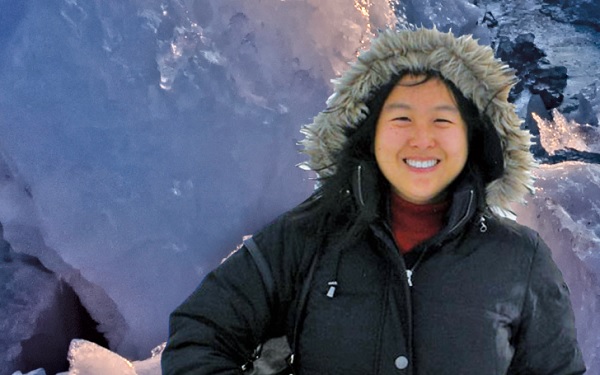
"Oh, you are an Eskimo!" The Naskapi natives looked at the young girl with yellow skin and black hair who spoke English in front of them, and gathered around her affectionately. Yang Yue was stunned for a moment. She knew she was an ABC (American of Chinese descent) since she was a child, but she didn’t expect that on the first day she landed in Canada’s Naskapi tribe after all these miles, she would be recognized as one of their aborigines, and the distance would immediately become much closer. She raised a bright smile and replied: "I am not an Eskimo, I am Chinese. Have you ever seen a Chinese? Chinese and Eskimos look very similar."
"My husband Martin and I immigrated from Texas, USA. We hope to learn your language and culture, make friends with you, and help your diocese translate the English Bible into Naskapi script."
This is the scene when Martin and Alice Reed, missionaries from Wycliffe Bible Translation Agency (Wycliffe), arrived in Kawawachikamach, Quebec on a snowy morning in March 2017. The temperature in Kawawa Village that day was minus 30 degrees Celsius. Although it was cold and freezing, the two of them had hot hearts. They silently prayed to God that since he had brought them all the way here, he would allow them to get along well with the local translators. , translate God’s precious words into Naskapi script as soon as possible so that the local people can read them.

▲Panorama of Kawawa Village.
ancient cree nation
The Naskapi are a group of people in Canada broadly known as the Cree People. The more than 100,000 Cree people in Northern Canada are scattered in the form of tribes from east to west in the vast and sparsely populated subpolar climate zone. They are divided into five major regions based on language similarity: Plains Cree and Oji Cree. , Swamp Cree, Forest Cree, and Northern Abbot Cree.
Wycliffe Bible Translator (Wycliffe) felt that these indigenous people desperately needed to read the Bible in their mother tongue that could penetrate their hearts. Twenty-six years ago, Wycliffe launched the "Cree Bible Translation Project". After many difficulties, it finally trained a group of Aboriginal translators completed the first Naskapi New Testament in 2007. Now Yang Yue and Martin have taken over the task, assisting and guiding local co-workers in Kawawa Village to translate the Old Testament Exodus into native languages. Over the next fifteen years, the two of them committed themselves to God's call: wherever the Cree people were thirsty for the nourishment of God's word and needed Bible translation in their native language, they would move there without hesitation and do their best to complete the holy work.

▲"Cree Bible Translation Project": Plains Cree (yellow), Oji Cree (purple), swamp Cree (red), forest Cree (ink), and Northern Abbot Cree (green), Naskapi (blue).
life goals turning point
"The place where God calls you is where your greatest joy meets the world's greatest hunger." A few years ago, Yang Yue read this famous quote by theologian Frederick Buechner and immediately knew that this was God's call to her. She was called to turn her life around and use her talents in language and her passion for understanding each other across cultures to translate the Bible and spread the gospel.
Yang Yue was a top student in the Department of French and Cultural Anthropology at Columbia University. After graduation, she worked in Chicago as a marketer for one of the top 100 retail companies in the country, where she was very comfortable. I have more time, many friends, travel frequently, and live a comfortable life. But she questioned in her heart, "Is this how life is?" At that time, her church offered a course on "Aspects of World Christian Movements." During her study, she saw that from Genesis to Revelation, God's eternal plan is that His name is in Receive due praise and glory among all races and peoples.
One day, the class invited a Bible translator from Wycliffe to share her ministry. As she listened, Yang Yue felt excited. It turned out that she could combine her unique language talent with her love for the Lord and transcend cultural barriers to translate the Bible. , as her lifelong ambition, so that all races and peoples can see God’s deeds, glorify and praise God.
The road ahead became clear, and three months later, she quit her job and entered Dallas Theological Seminary to pursue a master's degree in biblical exegesis and linguistics. While in school, God prepared her like-minded future husband Martin, and they studied together and sought God's guidance. In 2015, Yang Yue was awarded the "Taylor Award" at the graduation ceremony, which is a major encouragement given by the school to "students who can demonstrate special cross-cultural missionary potential."
Bible translation equipment
"In addition to my studies, what is surprising to me is that God has also equipped me in the workplace. I used to be a project manager and know how to set goals, do publicity, and promote business. These experiences are also very helpful for Bible translation, because light has Without publicity, it is difficult to arouse the interest of local people in reading. They do not know how these Bible stories and scriptures written in their native language are relevant to their daily lives. So recently we celebrated the publication of the Naskapi New Testament. On the occasion of the anniversary, we launched a series of promotional activities: photo exhibitions, children's games, book discounts, and introductions on their only native language radio station. In addition, we compiled and published the psalms that we had translated sporadically in previous years. Everyone is pre-ordering." Yang Yue said, "I am very happy to think that Naskapi people will soon be able to recite 150 great psalms in their native language and directly receive God's enlightenment and comfort."
According to a survey by the Wycliffe Institute, there are still 1,600 ethnic minorities around the world who do not have a Bible to read in their own mother tongue. After Bible translation missionaries arrive in areas where ethnic minorities live, they learn the aboriginal languages and at the same time find local co-workers who are well-trained in their native languages to complete the translation work. But this is where the difficulty lies. Many unexpected things will hinder the progress of translation, making people have to be alert: this ministry is too important, it is a spiritual battlefield fought by the devil, and it requires many intercessory partners in the back to support its completion. "Some people ask, why does it take ten to fifteen years to publish a New Testament Bible in the mother tongue? Because the enemy Satan always tries to find ways to prevent people from having the opportunity to know the gospel," Yang Yue said. This realization came from her observations over the past few months.
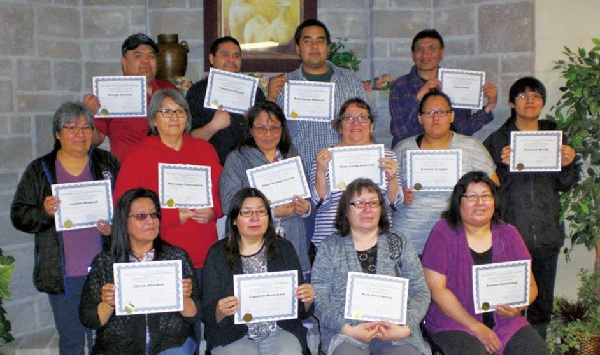
▲The 2017 Northern Canadian Aboriginal Bible translation study ended, and all the tribal learners held certificates.
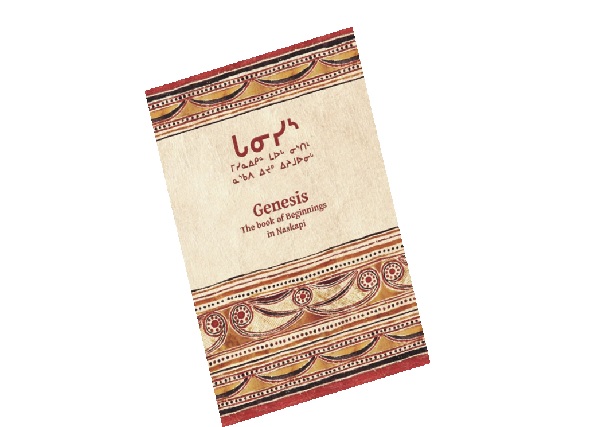
▲The cover of the Naskapi Old Testament book of Genesis, translated in 2013.
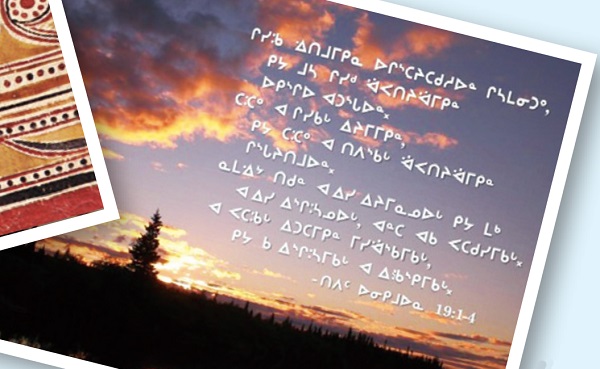
▲The cover of Naskapi’s Old Testament Psalms, which is newly printed and will be shipped to Kawawa Village.
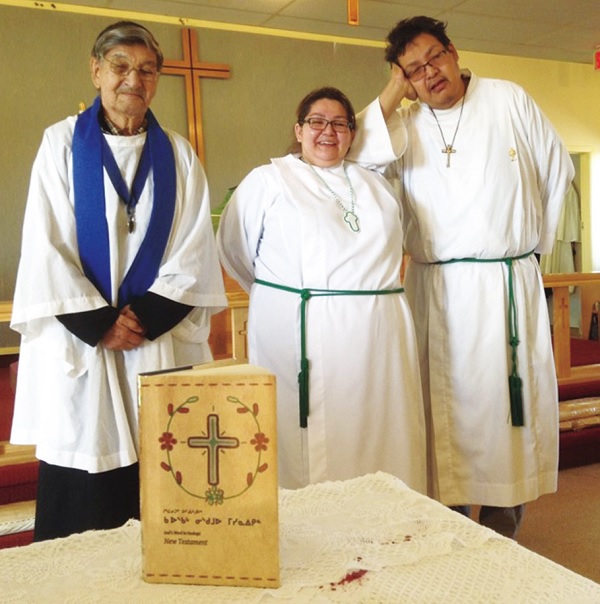
▲Three church members of Kawai Village Church (St. John’s Anglican Church) took turns reading the Naskapi New Testament on Sunday to celebrate the 10th anniversary of the publication of the Bible. Sister Cheyenee in the middle specially sang Naskapi hymns.
A tribe in danger
On the second day after Yang Yue and Martin arrived at Kawawa Village, they were full of expectations and ready to meet with their fellow translators. Suddenly, unfortunate news came: not far away, a big car accident had just occurred. A four-year-old girl, her mother and sister were playing on a snowmobile on a snow slope. When they rushed down, a truck happened to pass by and hit them. The youngest girl died on the spot and the others were seriously injured.
The child's mother was one of the Bible translators, and Ruby, the important coordinator of the entire Naskapi translation project, was also the landlord who moved the room for Yang Yue to live in, and was the child's aunt. As the village is small and more than a hundred residents are related to each other, the accident frightened the whole village and plunged them into great sadness. It was not until the child's funeral was held a month later that everyone slowly calmed down.
Yang Yue and Martin were deeply shocked by this sudden tragedy. They issued an urgent prayer, put aside Bible translation, and focused on the physical and spiritual care of the villagers. They accompany and comfort the families of the victims, deliver food, assist with funeral arrangements, and share the sorrow and joy of the villagers. Over the past few months, by actively participating in the daily activities of the villagers and learning the Naskapi language, they heard many family stories. It turned out that many people had experienced sad past events such as suicide, alcoholism, drug use, illness, accidents, and death in their family members, which had not happened for a long time. Can't get out.
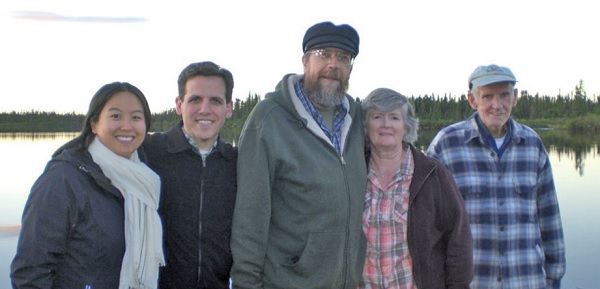
▲Wycliffe Bible translation missionaries (from left): Yang Yue and Martin, their supervisors Bill & Norma Jean Jancewicz, and Bible translation consultant Watson Williams in Quebec in 2017.
This general feeling of trauma and sadness pervades Kawawa Village, and even the main translators are no exception. A co-worker who has the most gift of translation has a busy job as a church elder, but he is often unable to participate in the translation work because he cannot get rid of his bad habit of drinking and hangover. A co-worker has to accompany his husband who suddenly fell seriously ill to a big city for medical treatment for several months. And unable to work; a young mother is passionate about learning translation, but the childcare problem keeps distracting her... and so on.
"There is a very lack of psychological counseling resources here. Although there is a church, there is no resident pastor and no Sunday school. Most people feel very far away from God and even doubt and despair about God." Yang Yue observed. "People use their own methods to relieve pain, but they cause more harm due to improper methods. The most difficult thing for me is that when I see this situation, I have to restrain myself from giving immediate advice to others and learn to empathize Understand, listen, and when the time is right, offer some words of God to respond to their thoughts.”
God provides beautiful resources
The frozen Kawawa Village may easily make people fall into melancholy in winter, but in summer it is full of life once the ice and snow melt, and nature reveals vast and beautiful scenery. Yang Yue marvels at the miraculous provision of the Creator. I saw groups of villagers who love outdoor sports rowing boats into the lake to catch barrels of big fish, or walking into the dense forests to hunt elk, black bears, ptarmigans, and wild geese, and return home with loads of food. The grassland hills are covered with red, blue and black sweet and juicy wild berries, which are picked and made into jam. They keep the secret recipe passed down from their ancestors and cut off the bark and root pieces of the plant and boil water to make medicine. Most of the villagers are skilled in traditional handicrafts. After eating the venison, they leave the antlers or bones and cut them into beautiful decorations such as earrings and necklaces. Bear marrow fat is regarded as a high-grade tonic by the locals. It is stored in small boxes and is only taken out when honoring the elders. After the hunted animal skins are soaked and smoked, some are made into drum heads, and some women sew children's soft shoes stitch by stitch, which is very Indian. Summer is also the celebration season for the Naskapi people. Villagers put on their own traditional costumes and enjoy a happy time together eating, drinking, dancing, playing drums and singing.
When Yang Yue and Martin first arrived, they were not used to the isolated, monotonous and slow life in the village. But now they have adjusted their mentality and pace, made many friends, learned new things every day, and are increasingly able to integrate into local life. In fact, Kawai Village is the most advanced and well-equipped autonomous village among all the Cree tribes - it has running water, electricity, heating, and a few people are also equipped with computer networks; there are more than 100 houses there, and School, sports center, and a small grocery store. But there is no hospital, no hotel, or restaurant in the village.
Where on the map is the Kawawa Village Aboriginal Autonomous Region located? If you get off the plane from Montreal Airport, you first need to take an eleven-hour bus to Sept-Îles, then transfer to a train that only runs one or two times a week. After a fourteen-hour ride, you will arrive in Shafferville, and then get off at Shizi. It takes half an hour to drive to the village. Visitors can stay at several hotels in Shafferville, which have Wi-Fi and meals. Kawawa Village has temperatures below 0 degrees Celsius for seven months of the year, and the temperature only rises to about 12 degrees Celsius in July and August.
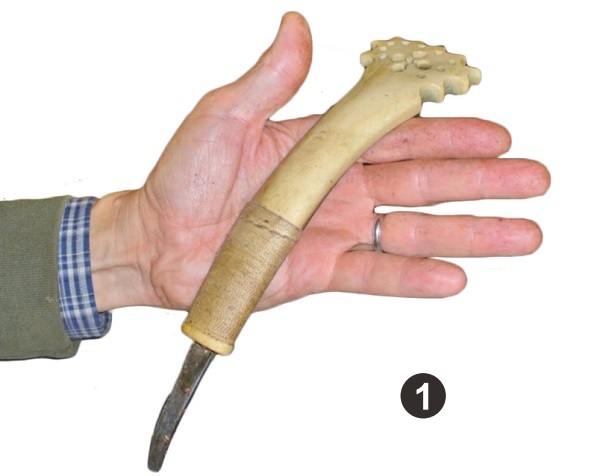
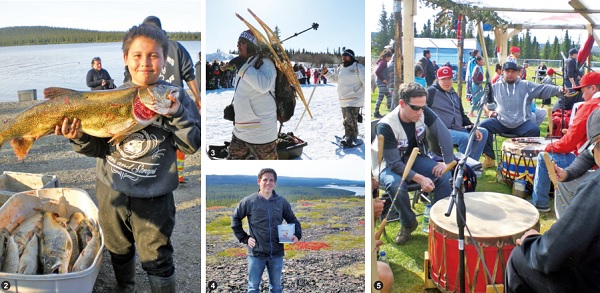
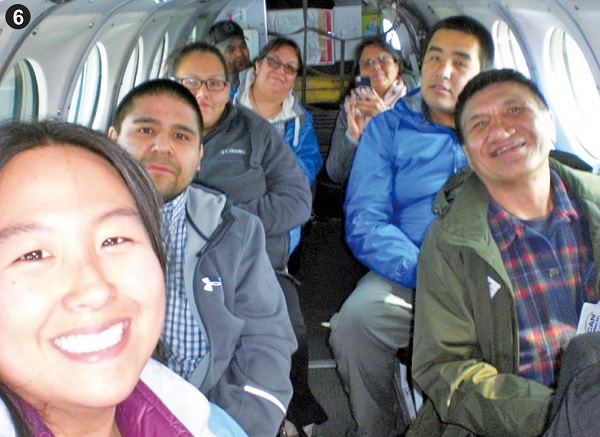
1. Fishing in spring and summer is the favorite activity of Kahua villagers. Children display large fish caught by their parents.
2. A knife handle carved from the bone of a large-antlered deer.
3. In order to commemorate their ancestors, Naskapi spent a month walking more than 300 kilometers in the snow from his old residence back to Kawawa Village. He put on traditional clothes and received a warm welcome from the villagers.
4. There are wild berries everywhere near Kawawa Village for Martin to pick.
5. At the Pow Wow celebration, Martin took part in traditional men's drumming, for which he studied for several months. 6. The co-workers returned from studying at the "Aboriginal Bible Translation Seminar" in 2017 and took a small plane back to Kawawa Village.
Villagers look forward to Bibles in mother tongue
Yang Yue and Martin are currently assisting in the translation of Exodus. They recently visited an old couple in the village. The old couple said that they read the Bible every day and often invite friends to their home for Bible study. I heard that Yang Yue-Martin was assisting in translating the Old Testament and told them very excitedly: "Although we have the New Testament in Naskapi, we still long to read Exodus, Samuel, Job, and Isaiah in our mother tongue. Yash..." This urgent desire from the indigenous people is the driving force behind the Bible translation missionaries who are not afraid of hardships and go to the ends of the earth.
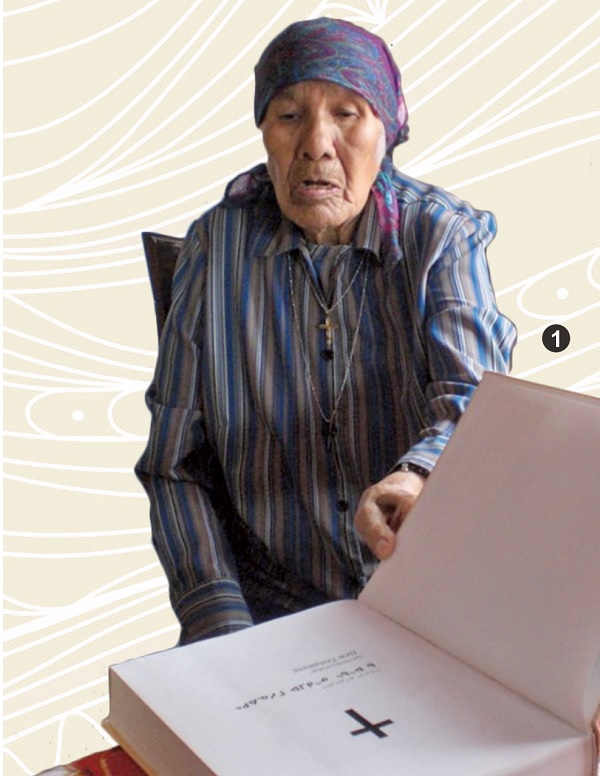
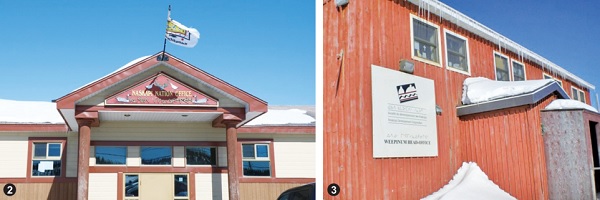
1. The old woman Susan was eager to read the Bible in her mother tongue and urged Yang Yue to quickly translate more Old Testament Bibles. The picture shows the large print version of the Naskapi New Testament.
2. Naskapi Aboriginal Territory Office. 3. This red building is where Yang Yue works on Bible translation and is owned by the Naskapi Development Department.
Open up wasteland and move forward
Revelation 14:6 says, “Then I saw another angel flying in the sky, carrying the everlasting gospel to preach to everyone who lives on the earth, to every nation, every tribe, every language group, and every language group. nationality."
Yang Yue and Martin's internship in Kawawa Village is coming to an end. The language, customs and culture learned from this small village, as well as the difficulties encountered during the translation process, are all valuable experiences for launching more Cree Bible translations in the next fifteen years. They are seeking God’s next step in prayer. Their mission will contact five other Cree-speaking tribes to see which tribe needs them the most to relocate to.
Yang Yue grew up and was baptized in the West End Chinese Church in Xiaoston, Texas. Her missionary work was inspired by the teachers of her mother church and supported by the congregation. Although accustomed to the warmth of Texas and the convenience of the city, the young missionary couple was not afraid of hardships and continued to move north. The Cree villages they will go to may be colder and more depressed, but their hearts are fervent and they believe that the Holy Spirit will give them the power to use their gifts, lead people to believe in the Lord, and respond to God’s call with their lives.
postscript
The small church in Kawahua Village opened its first Sunday School for children on September 17, 2017. The aborigines sang peaceful and beautiful hymns in their native language to thank God. Readers interested in the Cree Bible Translation Ministry can go to FacebookKaleidoscope – Reeds' Ministry
If you would like to pray and donate to support this ministry, please visit Wycliffe.org/partner/reed.
 TianmiA former journalist, Yang Yue is her daughter in the article. A pen connects the hearts of mother and daughter even more, and they experience God's wonderful use and guidance together.
TianmiA former journalist, Yang Yue is her daughter in the article. A pen connects the hearts of mother and daughter even more, and they experience God's wonderful use and guidance together.
